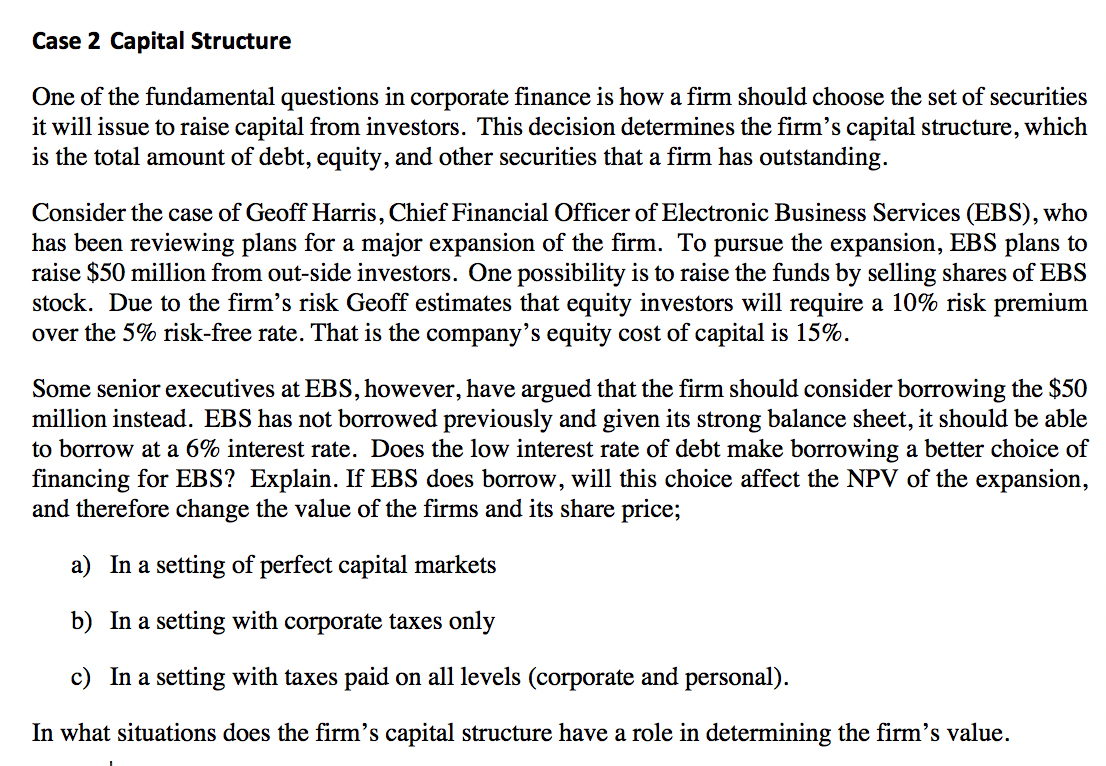
Case 2 Capital Structure One of the fundamental questions in corporate finance is how a firm should choose the set of securities it will issue to raise capital from investors. This decision determines the firm's capital structure, which is the total amount of debt, equity, and other securities that a firm has outstanding. Consider the case of Geoff Harris, Chief Financial Officer of Electronic Business Services (EBS), who has been reviewing plans for a major expansion of the firm. To pursue the expansion, EBS plans to raise $50 million from out-side investors. One possibility is to raise the funds by selling shares of EBS stock. Due to the firm's risk Geoff estimates that equity investors will require a 10% risk premium over the 5% risk-free rate. That is the company's equity cost of capital is 15%. Some senior executives at EBS, however, have argued that the firm should consider borrowing the $50 million instead. EBS has not borrowed previously and given its strong balance sheet, it should be able to borrow at a 6% interest rate. Does the low interest rate of debt make borrowing a better choice of financing for EBS? Explain. If EBS does borrow, will this choice affect the NPV of the expansion, and therefore change the value of the firms and its share price; a) In a setting of perfect capital markets b) In a setting with corporate taxes only c) In a setting with taxes paid on all levels (corporate and personal). In what situations does the firm's capital structure have a role in determining the firm's value. Case 2 Capital Structure One of the fundamental questions in corporate finance is how a firm should choose the set of securities it will issue to raise capital from investors. This decision determines the firm's capital structure, which is the total amount of debt, equity, and other securities that a firm has outstanding. Consider the case of Geoff Harris, Chief Financial Officer of Electronic Business Services (EBS), who has been reviewing plans for a major expansion of the firm. To pursue the expansion, EBS plans to raise $50 million from out-side investors. One possibility is to raise the funds by selling shares of EBS stock. Due to the firm's risk Geoff estimates that equity investors will require a 10% risk premium over the 5% risk-free rate. That is the company's equity cost of capital is 15%. Some senior executives at EBS, however, have argued that the firm should consider borrowing the $50 million instead. EBS has not borrowed previously and given its strong balance sheet, it should be able to borrow at a 6% interest rate. Does the low interest rate of debt make borrowing a better choice of financing for EBS? Explain. If EBS does borrow, will this choice affect the NPV of the expansion, and therefore change the value of the firms and its share price; a) In a setting of perfect capital markets b) In a setting with corporate taxes only c) In a setting with taxes paid on all levels (corporate and personal). In what situations does the firm's capital structure have a role in determining the firm's value







